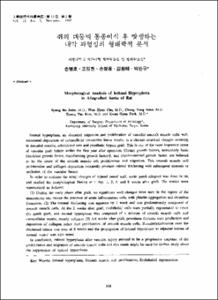쥐의 대동맥 동종이식 후 발생하는 내막 과형성의 형태학적 분석
- Keimyung Author(s)
- Cho, Won Hyun; Kim, Hyoung Tae; Park, Kwan Kyu
- Journal Title
- 대한혈관외과학회지
- Issued Date
- 1997
- Volume
- 13
- Issue
- 2
- Abstract
- Intimal hyperplasia, an abnormal migration and proliferation of vascular smooth muscle cells with associated deposition of extracellular connective tissue matrix, is a chronic structual changes occuring in denuded arteries, arterialized vein and prosthetic bypass graft. This is one of the most important cause of vascular graft failure within the first year after operation. Certain growth factors, particularly basic fibroblast growth factor, transforming growth factor-p, and platelet-derived growth factor, are believed to be the cause of the smooth muscle cell proliferation and migration. This smooth muscle cell proliferation and collagen deposition eventually produce intimal thickening with subsequent stenosis or occlusion of the vascular lumen.
In order to evaluate the serial changes of injured vessel wall, aortic patch allograft was done in rat, and studied the morphological finding at 1 day, 1, 2, 6, and 8 weeks after graft. The results were summerized as follows;
(1) During the early phase after graft, no significant wall changes were seen in the region of the anastomotic site except the presence of acute inflarnmatory cells with platelet aggregation and thrombus formation. (2) The intimal thickening was apparent by 1 week and was predominantly composed of smooth muscle cells. At the 2 weeks after graft, endothelial cells were partially regenerated to cover the patch graft, and intimal hyperplasia was composed of a mixture of smooth muscle cells and extracellular matrix, mostly collagen. (3) Six weeks after graft, prominent features were production and deposition of collagen rather than proliferation of smooth muscle cells. Reendothelialization over the thickened intima was seen at 8 weeks and the propagation of intimal hyperplasia to adjacent intima of normal vessel was also noted.
In conclusion, intimal hyperplasia after vascular injury seemed to be a progressive response of the proliferation and migration of smooth muscle cells and this result might be used for further study about the suppression of intimal hyperplasia.
- Alternative Title
- Morphological Analysis of Intimal Hyperplasia in Allografted Aorta of Rat
- Publisher
- School of Medicine
- Citation
- 손병호 et al. (1997). 쥐의 대동맥 동종이식 후 발생하는 내막 과형성의 형태학적 분석. 대한혈관외과학회지, 13(2), 141–150.
- Type
- Article
- ISSN
- 1229-991X
- Appears in Collections:
- 1. School of Medicine (의과대학) > Dept. of Pathology (병리학)
1. School of Medicine (의과대학) > Dept. of Surgery (외과학)
- 파일 목록
-
-
Download
 oak-bbb-03353.pdf
기타 데이터 / 770.32 kB / Adobe PDF
oak-bbb-03353.pdf
기타 데이터 / 770.32 kB / Adobe PDF
-
Items in Repository are protected by copyright, with all rights reserved, unless otherwise indicated.